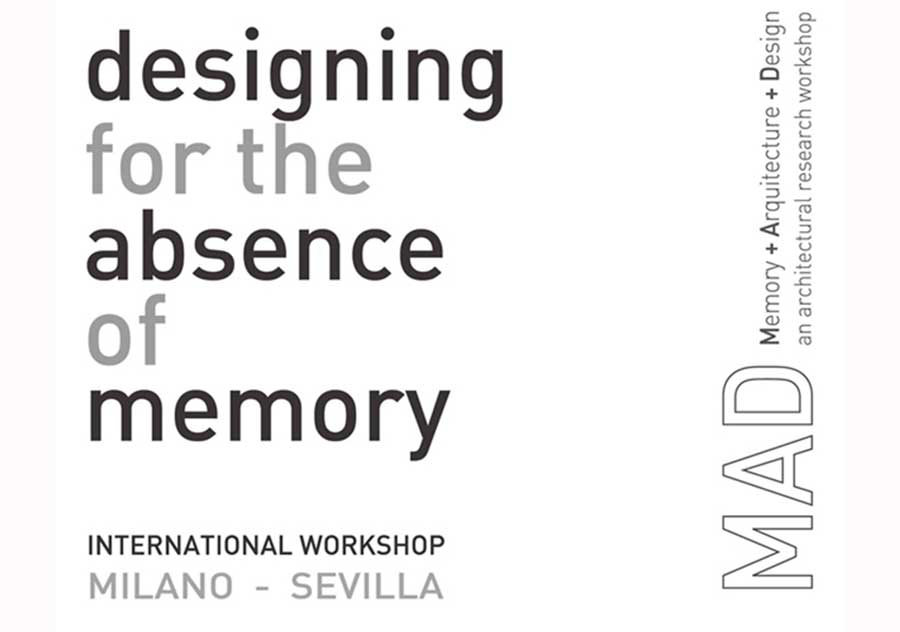
Dottorato in Progettazione Architettonica, Urbana e degli Interni – XXXIV ciclo
MILANO – SEVILLA / March – June 2019
Memory and its relationship with people’s physical environment is a line of research that will be addressed from a Neuroarchitecture perspective. This field researches how different aspects of an architectural environment can influence certain brain processes, such as stress, emotion, memory, or learning. The Neuroarchitecture investigates functional requirements for buildings to improve certain daily activities. Based on the individual needs in question, various areas of study are addressed, such as sensory perception, routes, orientation, space, and place. Understanding the principles of neuroscience might be useful as a guide for designing the building’s environment, improving spatial orientation, reinforcing cognitive abilities, and facilitating positive emotions and motivation.
We will focus this workshop research on several scales, including regional and urban scale. This research may diverge into a different field, which we call “memory” as the subject constructor, in which we carry out research encompassing the fields of landscape heritage and architectural design. Concepts in which memory constitutes an existing, inherited consolidated substrate is also material for project research in architecture. On a domestic level, research will focus on designing open, tailored spaces for the absence of memory. It will tackle solutions for people dealing with memory problems, connect the aging population with adaptable housing by considering new technologies, and focus on groups affected by certain types of cognitive disabilities.
GOALS
1. Provide tools to research architectural fields to design healthy and intelligent environments in order to improve people’s quality of life and well-being, using scientific acquisitions and evidences made available from neuroscientific studies.
2. Develop and create architectural knowledge with special attention to the emotional engagement of inhabitants, developing their life and activities inside buildings.
3. Provide tools and other elements of architectural composition that might be useful as a bridge between the cognitive desires of the users and the multisensory experience that they might have in environments where they develop their daily activities.
TOPICS TO RESEARCH
- Innovations, projects, and compositions necessary to design healthy and intelligent environments, focusing on improving people’s quality of life and well-being. meaningfulness in architecture and planning a suitable environment for the aging population.
- Study and development of the salutogenic model: manageability, comprehensibility, an meaningfulness in architecture.
- Understanding human responses to built environments through neuroarchitecture.
- Challenges to societal health, demographic and social change, and well-being design.
- New architectural typologies aimed at the well-being of patients with dementia and other medical conditions
- The model of heritage in health. Creating cartographies, maps or labeling assets in health and healthy environments.
- Key Enable Technologies (KET) in Architecture.
- Memory and its relationships with heritage, landscape, and contemporary architecture.
PLAN & SCHEDULE
The Workshop will be divided into four Workminars, distributed between the months of March and June 2019. They will be held in the cities of Milan, Seville and Malaga. Each Workminar will be articulated around several sessions. Each session will take place in four hours with an intermediate break of half an hour.
Workminar #1
March 2019, 28th. MILANO.
Exploring the research about Memory
TRAINING ACTIVITIES:
Presentation of methodological resources and dissemination of research results. Methods for research derived from professional practice, theoretical and experimental or field work, or based on creative or innovative experiences. What is the structure of research today? Also in this workminar, professors will present the next topics to research.
Wk # 1-1. OPENING LECTURES SESSIONS I
March 2019, 28th | 14:00 – 18:00 |
- Lecture 1_ Designing for the absence of memory
Prof. PhD. Santiago Quesada-García
- Lecture 2_ Pathological spaces
Prof. PhD. Pierluigi Salvadeo
- Lecture 3_ Loss of Self – Space and Project as Therapy
Prof. PhD. Andrea Di Franco
Workminar #2
April 2019, 8th– 11th. SEVILLA / MÁLAGA
Contextualizing the research about Memory within the fields of Architecture and Medicine
TRAINING ACTIVITIES:
A series of lecturers will give short presentations that represent different forms of research, including health, architectural design, health and humanities, history and theory, social sciences, and science-based models.
SEVILLA Workminar #2
Wk # 2-1. Visit sites and modern architecture in Seville
April 2019, 8th | 10:30 | Appointment: Seville College of Architects. Plaza Cristo de Burgos.
Wk # 2-2. LECTURE SESSIONS II
April 2019, 9th | 10:30 | School of Architecture. University of Seville. Avenida Reina Mercedes 2
- 10,30 – 11,30 | Lecture 4_ Designing the enjoyment of present
Prof. PhD. Julio Barreno Gutiérrez
- 12,00 – 13,00 | Lecture 5_ A graying society. The rise and fall of Japanese Megalopolis
Prof. PhD. Joseph Cabeza-Laínez
- 13.00 – 13:30 | Discussion table
MÁLAGA Workminar #2
Wk # 2-4. LECTURE SESSIONS III
April 2019, 10th | 10:30 | AFA Málaga. Carretera de los Almendrales 35, Málaga
- 10:30 | Visit to the AFA Málaga.
- 11,30 – 12,30 | Lecture 6_ Update on Alzheimer´s disease diagnostic & prevention
Prof. PhD. Pablo Lara Muñoz | Prof. PhD. Miguel Ángel Barbancho
- 12,45 – 13,30 | Lecture 7_ Translational research, new methodological processes in architectural research. PhD candidate Pablo Valero Flores
- 13.30 – 14.00 | Discussion table
Wk # 2-5. VISIT TO THE EXERCISE PROJECT SITE
April 2019, 10th | Fuengirola-Mijas Costa. Calle Agustina de Aragón 3, Fuengirola (Málaga)
- 16:30 | Visit to AFA Fuengirola-Mijas Costa and exercise project site.
Workminar #3
May 2nd, May 3rd & May 16th. MILANO.
Time: 14:00 / 18:00
Defining the research to develop
TRAINING ACTIVITIES:
The workshop explores the creation of new knowledge and how, or in which modes, it is developed into research.
Wk # 3-1. WORKSHOP & LECTURE SESSION IV
May 2019, 2nd | 14,00 – 18,00
Delivery of research plan by students will include at minimum the methodology to be used and the objectives to be achieved, as well as the means or resources required to achieve it. Draft document extension: Between 3,000 / 6.000 characters.
- May 2019, 3rd | 14,30 – 15,30 | Lecture 8_ Favorire il benessere nei luoghi della malattia: il contributo della Psicologia Ambientale. Prof. PhD. Paolo Inghilleri
Wk # 3-2. FOLLOW-UP WORKSHOP OF THE RESEARCH PLAN
May 2019, 16th | 14,00 – 18,00
Through a combination of small group interactions, workshop participants will be guided to refine and strengthen their research.
Workminar #4
June 13th. MILANO.
Final delivery and presentation of the Project & Research
A- Contents of the Research Plan and Paper proposal:
- Title
- Summary in each language (maximum 300 words)
- Definition of scope and objectives
- State of the art, also defining the principal international reference groups
- Methodology
- Stages plan and task scheduling
- Plan for the dissemination of research results
Extension: Maximum 30,000 characters
B- Contents of the Architectural Project:
Three A3 formats with concept, main plan, details, renders and some model of the project.
Scales 1:1000/1:500/1:300/1:100
Delivery online


